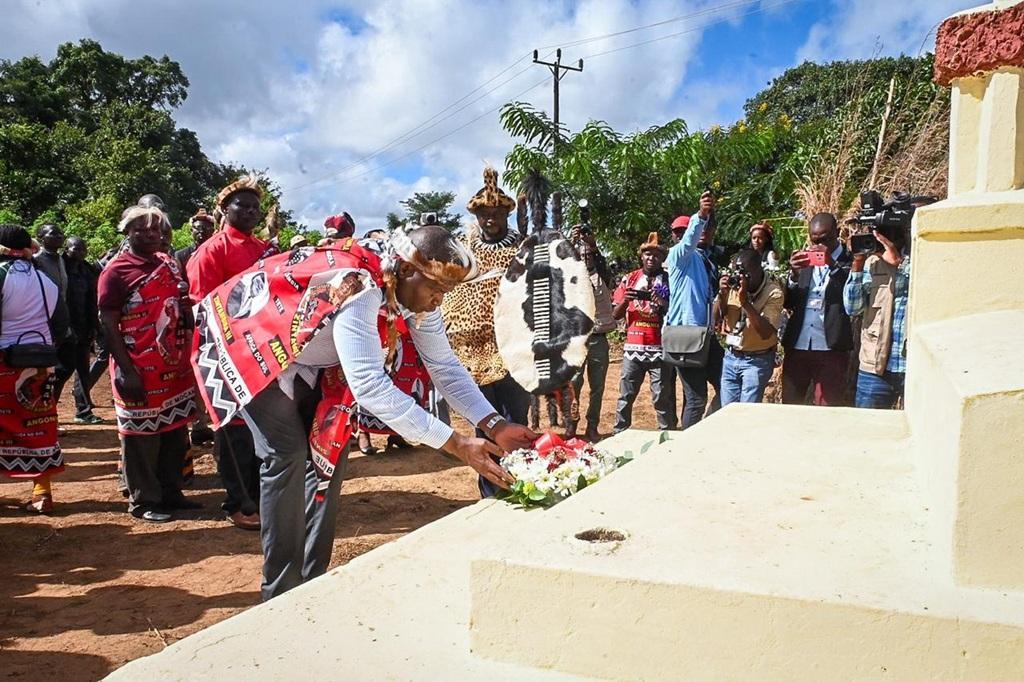Africa-Press – Mozambique. It was with the ceremonial weight of drums and the reverent silence of ancestors that the President of the Republic, Daniel Chapo, set foot on the soil of the Kingdom of Zitambira, in the district of Angónia, province of Tete, this Tuesday. Received by King Zitambira V, born Horácio Sebastião Marcos Dama Zintambira, the head of state immersed himself in a deeply symbolic act, but loaded with political, cultural and institutional messages.
Officially, it was a courtesy visit. But those who understand the rituals of power know that, in Mozambique, the symbolic is often more eloquent than the formal. In a country with multiple nations within the Nation, visiting a traditional kingdom also means reinforcing invisible alliances, validating parallel structures and rewriting, even if temporarily, the hierarchy of the state.
Chapo knew where he was stepping. The Kingdom of Zitambira is not just a folkloric piece in an anthropological inventory; it is an axis of belonging for a people, the Nguni, with roots spread across Mozambique, Zambia, Tanzania and Malawi. People with a powerful oral tradition, with their own codes of governance, with an idea of justice shaped by consensus, not by sentence.
And there, at the foot of history, Chapo symbolically knelt before a power that does not emanate from the Constitution, but from the sacred, from blood, from collective memory.
The tribute to the late Queen Zitambira IV had the weight of a gesture that goes beyond protocol. Wreaths of flowers were laid on the graves of the three deceased kings. A ritual silence enveloped the ceremony. No political word would have had more force at that moment.
But Chapo spoke – and well. He hailed the late monarch as a woman of “vision and social sensitivity” and gifted with “wise leadership.” And, addressing the newly inaugurated King Zitambira V, he handed him the invisible baton of the state’s trust:
“We are confident that Her Majesty will continue the Queen’s legacy and promote harmony, dialogue and progress in the community.”
But anyone familiar with the intricacies of traditional power knows that verbal recognition is not enough. The real and functional integration of traditional leaders into the local governance system continues to be the Achilles heel of the Mozambican State — which, on the one hand, glorifies the chiefs as guardians of culture, and on the other, limits their decision-making space in public policies.
In his speech, Chapo argued that traditional leaders should be integrated into the design and implementation of public programs, especially in rural areas. He spoke of community justice, agriculture, health and education.
Does the government want to truly share power with traditional authorities, or merely mobilize them ceremonially during election times and natural disasters?
On the ground, it is known that the chiefs are often still used as instruments, without budgetary autonomy or a binding voice. And yet, they are the ones who ensure cohesion, conflict resolution and social continuity where the state is absent or ineffective.
The population of Angónia welcomed the president with celebration, but also with hope. For many, seeing the head of state recognize the king is also seeing themselves recognized as a people. It is an act of identity validation in a country where the centrality of Maputo still prevails as the norm.
With this visit, Daniel Chapo is trying out a policy of proximity, trying to stitch the country together from the reverse side of history: through its roots and not just through its formal institutions.
For More News And Analysis About Mozambique Follow Africa-Press






